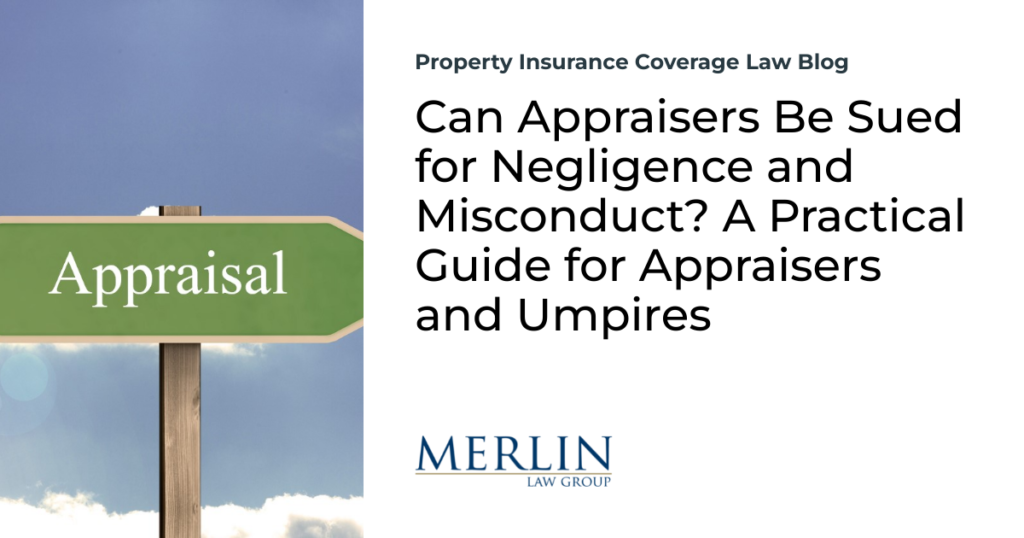Can Appraisers Be Sued for Negligence and Misconduct? A Practical Guide for Appraisers and Umpires

Appraisal disputes can often be contentious and adversarial. I frequently hear tales of insurance company appraisers going to great lengths to reduce the award amount. Similarly, I believe my colleagues who represent insurance companies hear stories about the insured’s appraiser doing everything possible to increase the award amount.
Is it possible for parties to sue appraisers for misconduct? If so, what types of misconduct? How can appraisers and umpires safeguard themselves from such legal actions?
As a follow-up to my recent post, Can the Appraisal Panel Consider Amounts Previously Agreed to and Paid By the Insurer?, another active Pennsylvania lawsuit has made partial rulings on the questions raised.1 The case involved these facts:
Plaintiffs Kevin and Danielle DeAngelis initiated this action against Defendants Encompass Home and Auto Insurance Company (‘Encompass’), which is their insurer, and Victor A. Hoffman, Jr., an appraiser, after their home was damaged in a windstorm. The Complaint asserts claims against Encompass for breach of contract and bad faith …and claims against Hoffman,…for negligence, intentional misconduct, tortious interference with contract, and “third party beneficiary.
…
The Complaint contains four Counts against Hoffman. Count III asserts a negligence claim, alleging that Hoffman breached a duty to maintain impartiality during the appraisal process ‘by improperly accepting direction from Encompass as to the scope and limits of the appraisal.’ Count IV asserts an ‘intentional misconduct’ claim, alleging that Hoffman acted ‘in an intentional and reckless manner to deprive Plaintiff[s] of [the] benefits’ owed to them under the Policy. Count V asserts a claim for tortious interference with contract, alleging that Hoffman interfered with Plaintiffs’ contract with Encompass by failing to act as an independent and unbiased appraiser. Count VI asserts a ‘third party beneficiary’ claim against Hoffman, alleging that Plaintiffs are third-party beneficiaries to a contract between Hoffman and Encompass and that Hoffman breached his duty under that contract to provide an impartial appraisal.
The court made the following observations about current Pennsylvania law on the topic:
The Complaint asserts in Count III that Hoffman is liable in negligence because he breached a duty owed to Plaintiffs to provide an impartial appraisal. Hoffman argues that we should dismiss this claim for failure to state a claim upon which relief can be granted because he has no duty to Plaintiffs….
…
The Pennsylvania Supreme Court has not addressed the question of whether an appraiser hired by an insurer owes a duty of care to the insured. In Tippett v. Ameriprise Ins. Co., Civ. A. No. 14-4710, 2015 WL 1345442 (E.D. Pa. March 25, 2015), the court predicted that the Pennsylvania Supreme Court would not impose such a duty. Noting that no intermediate appellate court in Pennsylvania or federal court had determined whether an adjuster owed such a duty, the Tippett court looked to decisions of other state supreme courts.
The court determined that all claims against the insurer’s appraiser should be dismissed, with the exception of the tortious interference with contract claim. I’ll discuss the insurer’s summary judgment motion against the final pending claim in a later post.
While some might argue that appraisers cannot be sued, this isn’t accurate. Appraisers can indeed be taken to court. However, based on current laws and the specifics of this case, it’s unlikely that such a lawsuit would be successful. Even if appraisers are victorious in court, they face a financial burden. They must cover their attorney’s fees and other related costs.
For appraisers and umpires, my recommendation is to invest in errors and omissions insurance. This can help offset the often hefty defense costs. In many cases, the cost of defense can surpass the disputed amount or the determined liability.
Finally, there’s an unresolved matter regarding immunity for appraisers and umpires who function in a quasi-judicial capacity. I will delve into this topic in an upcoming blog post.
Thought For The Day
I know that a Christmas tree farm in Pennsylvania is about the most random place for a country singer to come from, but I had an awesome childhood.
—Taylor Swift
1 DeAngelis v. Encompass Home and Auto Ins. Co., No. 21-2577, 2022 WL 118222 (E.D. Penn. Jan. 12, 2022).







